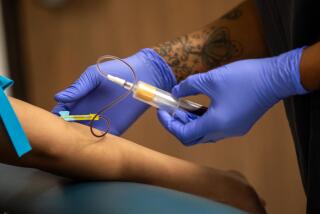Plan to Expand AIDS Testing Loses Support
- Share via
ATLANTA — In the face of widespread opposition, federal health officials indicated Tuesday that they have tempered their support for expanding the use of the controversial AIDS antibody test to include patients routinely admitted to hospitals, women being treated for pregnancy, and couples applying for marriage licenses.
“There has been a shift away from a more provocative position to a less provocative position--meaning proposing things that would provoke less controversy,” said one federal official who requested anonymity.
Change in ‘Tone’
Another federal health official, who has expressed reservations about wider use of the antibody test in the past, described the change in attitude as one of “tone,” saying: “Several months ago they were framing the ideas as ‘there should be . . . ,’ and now they are saying ‘should there be . . . ?’ ” he said.
At the same time, responding to concerns that the government might be moving toward compulsory national testing, Dr. James O. Mason, director of the Centers for Disease Control, told participants at a public meeting here that such a program has been “ruled out.”
One federal official noted the difference between voluntary testing, “which is patient-initiated,” routine testing, “which is initiated by the health care provider,” and mandatory testing, which requires legislation or other action by the states.
“I can assure you, we have never had the intention of going out and testing everyone,” he said.
During the three weeks since The Times disclosed that the CDC was considering recommending that the states implement wider testing, the officials have been flooded with opposition from many medical and public health personnel, gay rights and civil liberties groups. The groups fear that test information, unless kept anonymous or confidential, would result in stigmatization and be used to discriminate in such areas as employment, life insurance and medical insurance.
Speakers at the conference here, convened to debate further applications of the procedure, voiced almost universal opposition to anything but voluntary testing. Stressing that testing should be accompanied by counseling and confidentiality of test results, many said mandatory testing could not be justified on either ethical or public health grounds.
‘Social Placebos’
“Such interventions would be little more than social placebos designed to reassure a frightened people,” said Ronald Bayer, a medical ethicist with the Hastings Center of Hastings-on-Hudson, N.Y.
“This is not the time for placebos, but for a simple and hard truth--only the radical modification of private behavior will affect the trajectory of the AIDS epidemic,” Bayer added. Such modification will come only when there is an increased commitment to sexual education, he said.
Touches ‘Raw Nerve’
He said that “the mere suggestion that CDC was considering compulsory premarital testing and the universal screening of all hospital admissions touched an exceedingly raw nerve.”
But Dr. Robert Redfield, an AIDS researcher with the Army’s Walter Reed Research Institute, who supports widespread routine medical testing, predicted: “It’s just a matter of time. Doing the test will be part of the routine practice of medicine--it will be the standard of care. I think we need to get away from being afraid of practicing medicine and use all the tools we have.”
The test determines whether an individual has been exposed to the virus that causes AIDS, not whether the individual will contract the deadly disease. However, a person who tests positive is presumed to be infected and infectious to others. There is no medical treatment for infection.
More Men Infected
Dr. James Curran, director of the AIDS program for CDC’s center for infectious diseases, estimated that, of the 1.5 million Americans believed to be infected with the AIDS virus, men total 1,386,750, or 1 out of every 80 men, and women totaled 113,250, or one out of every 1,000 women--most in the age range of 30 to 39. He said CDC has estimated infection in this country at 50 times the number of reported AIDS cases.
As of Monday, there was a total of 31,036 cases in this country, of whom 17,851 had died.
AIDS, or acquired immune deficiency syndrome, destroys the immune system, rendering the individual powerless against otherwise rare infections and cancers. The virus can also invade the central nervous system, causing serious neurological disorders.
In the United States, it has afflicted primarily homosexual and bisexual men, intravenous drug users and their sexual partners.
More to Read
Get the L.A. Times Politics newsletter
Deeply reported insights into legislation, politics and policy from Sacramento, Washington and beyond. In your inbox twice per week.
You may occasionally receive promotional content from the Los Angeles Times.










